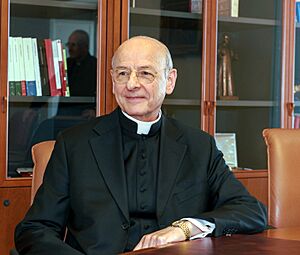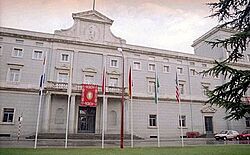Opus Dei facts for kids

Seal of the Holy Cross and Opus Dei
|
|
| Formation | 2 October 1928 |
|---|---|
| Type | Personal prelature |
| Purpose | Spreading the universal call to holiness in ordinary life |
| Headquarters | Viale Bruno Buozzi, 73, 00197 Rome, Italy |
|
Region served
|
Worldwide |
|
Membership
|
95,317 (2018) |
|
Founder
|
St. Josemaría Escrivá |
|
Prelate
|
Fernando Ocáriz Braña |
|
Main organ
|
General Council Central Advisory |
|
Parent organization
|
Catholic Church |
| Website | https://opusdei.org/ |
Opus Dei (Latin for 'Work of God') is a special part of the Catholic Church. It was started in Spain in 1928 by Josemaría Escrivá. Its main goal is to help its members, both regular people and priests, find holiness in their daily lives and jobs.
Opus Dei is officially recognized by the Catholic Church. It received full approval from Pope Pius XII in 1950. Later, in 1982, Pope John Paul II made it a personal prelature. This means it's like a special diocese without a specific territory. Most of its members are regular people, not priests. The rest are priests led by a prelate chosen by members and approved by the Pope.
Since "Opus Dei" means "Work of God" in Latin, members often call it "the Work." Besides their own good deeds, they offer training in Catholic spirituality for everyday life. Opus Dei has members in over 90 countries. About 70% of members live in their own homes with their families and jobs. The other 30% are celibate (unmarried) and most of them live in Opus Dei centers.
Contents
History of Opus Dei

How Opus Dei Started
Opus Dei was founded by Josemaría Escrivá de Balaguer on October 2, 1928, in Madrid, Spain. Escrivá said he had a special vision that day where he "saw Opus Dei." He chose the name "Opus Dei" (Work of God) to show that he believed it was God's work, not his own. Escrivá always felt that the founding of Opus Dei was a supernatural event.
He explained Opus Dei's purpose as helping ordinary Christians understand that their daily life can be a path to holiness and sharing their faith. For those who wanted to follow this path, Opus Dei offered spiritual help and training.
At first, Opus Dei was only for men. But in 1930, Escrivá began to include women, believing this was also God's will. During the Spanish Civil War, Escrivá faced danger and had to hide for three years. In 1939, he returned to Madrid. That same year, he published The Way, a book with 999 short sayings about spirituality for people in their everyday lives.
Opus Dei grew quickly during the time of Franco's rule. It spread across Spain and then internationally after 1945. Escrivá faced many challenges. He later said that Spain was where Opus Dei found "the greatest difficulties" from people who didn't like personal freedom or who misunderstood Opus Dei's ideas.
In 1947, after Escrivá moved the main office to Rome, Pope Pius XII officially praised and approved Opus Dei. This made it an organization directly under the Pope's authority. In 1950, Pope Pius XII gave final approval. This allowed married people to join and secular priests to become part of the Priestly Society of the Holy Cross.
Later Years and Growth
In 1975, Escrivá passed away. Álvaro del Portillo became his successor. In 1982, Opus Dei became a personal prelature. This means that Opus Dei is part of the Catholic Church, and its members' work falls under the direct leadership of the Opus Dei prelate, no matter where they are. However, lay members of Opus Dei are still under the authority of their local bishop, just like other Catholics.
Many bishops around the world asked for Escrivá to be made a saint. He was beatified (declared blessed) in 1992. In 2002, about 300,000 people gathered in St. Peter's Square when Pope John Paul II made him a saint. Other members are also being considered for sainthood, including Ernesto Cofiño, a doctor; Montserrat Grases, a student; and Dora del Hoyo, a domestic worker.
During Pope John Paul II's time, two Opus Dei members, Juan Luis Cipriani Thorne and Julián Herranz Casado, became cardinals. In 2005, Pope Benedict XVI blessed a new statue of Josemaría Escrivá at St. Peter's Basilica. Also in 2005, Opus Dei received attention because of the popular novel The Da Vinci Code. The movie version came out in 2006, which led to more discussions about the organization.
In 2014, Pope Francis beatified Álvaro del Portillo. Pope Francis said that Portillo "teaches us that in the simplicity and ordinariness of our life we can find a sure path to holiness." By the end of 2014, Opus Dei had spread to 69 countries, with members in 90 countries. Javier Echevarría Rodríguez, the second prelate, passed away in 2016. Fernando Ocáriz Braña was elected the new prelate on January 23, 2017, and Pope Francis confirmed his appointment that same day.
In 2019, Guadalupe Ortiz de Landázuri Fernández de Heredia, one of the first women to join Opus Dei, was beatified in Madrid. She is the first woman from the group to be beatified.
Pope Francis and Opus Dei
On July 22, 2022, Pope Francis issued a special letter called Ad charisma tuendum. This letter aimed to "safeguard the charism," or the original spirit of Opus Dei. It confirmed Opus Dei's special role in the Church and updated its organization. One change was that the head of Opus Dei can no longer become a bishop. Instead, he is called "Reverend Monsignor." The letter also moved responsibility for Opus Dei from one Vatican department to another. These changes became effective on August 4, 2022. Pope Francis explained that these actions were done with the help of Opus Dei's own experts and were not meant to be negative. On August 8, 2023, Pope Francis issued another letter, stating that personal prelatures like Opus Dei are similar to other public groups of priests.
Spirituality and Beliefs
Core Teachings
Opus Dei focuses on certain important Catholic beliefs. A key idea is the lives of regular laypeople. Opus Dei emphasizes the "universal call to holiness". This means everyone should try to be a saint, as Jesus taught: "Love God with all your heart" and "Be perfect as your heavenly Father is perfect." Opus Dei also teaches that holiness is possible for everyone, because Jesus said his demands are "easy" and "light," and God will always help.
Opus Dei does not have monks or nuns. Only a small number of its members are priests. Opus Dei stresses connecting spiritual life with work, social life, and family life. Members of Opus Dei live ordinary lives, with families and jobs, and try to make their "ordinary life" holy. Pope John Paul II called Escrivá "the saint of ordinary life."
Opus Dei also highlights the importance of work and doing a good job. It encourages its members and all Catholics to "find God in daily life" and to do their work as a service to society and an offering to God. Opus Dei teaches that work not only helps society but is also a "path to holiness."
According to the founder, this Catholic teaching comes from the Bible, like the idea that "God created man to work" (Genesis 2:15). Escrivá also pointed to Jesus' time as a carpenter and how he "has done everything well." A main idea in Christian life, as Escrivá taught, is divine filiation: Christians are children of God, connected to Christ's life and mission. Other important ideals of Opus Dei include freedom, respecting choices, taking personal responsibility, charity, and loving God and others.
Fernando Ocariz, the current prelate of Opus Dei, explains that Escrivá's idea of the "universal call to holiness" has two parts. The first is that each person is called to become a saint, no matter their place in society. The second is what Escrivá called Christian materialism: all of creation, even everyday things, can be a way to meet God and become closer to Him.
Prayers and Practices
All members, whether married or unmarried, priests or laypeople, learn to follow a 'plan of life' or 'norms of piety'. These are traditional Catholic devotions (ways of praying). This helps them follow the Catholic teaching to "pray at specific times...to nourish continual prayer."
Mortification
Opus Dei practices mortification of the flesh. This includes things like fasting and staying silent for certain hours, when it fits with family or work duties. Mortification has been practiced in many religions, including the Catholic Church, for a long time. Popes have supported it as a way to 'follow Christ', who suffered on the cross. Jesus said that anyone who wanted to be his follower should "deny himself, take up his cross daily and follow me."
Organization and Activities
How Opus Dei is Organized
In 1982, Pope John Paul II's decree Ut Sit made Opus Dei a personal prelature. This is an official part of the Catholic Church, similar to a diocese. It includes lay people and priests led by a bishop. However, unlike a regular bishop who leads a specific area, the prelate of Opus Dei is the pastor for Opus Dei members and priests worldwide. Opus Dei is the only personal prelature that exists. It follows the general laws of the Catholic Church and its own special rules, called Opus Dei's statutes. These rules explain its goals and how it works.
Opus Dei's most important meetings are the General Congresses, held every eight years. There are separate meetings for men and women. Members chosen by the prelate attend these meetings to advise him about the future of Opus Dei. The men's General Congress also elects the prelate from a list of candidates chosen by the women. After a prelate passes away, a special election meeting is held. The women suggest candidates for the prelate, and the men vote. The Pope must then confirm the chosen prelate.
The head of Opus Dei is called the prelate. He is the main leader and is helped by two councils: the General Council (for men) and the Central Advisory (for women). The prelate holds his position for life. The current prelate is Fernando Ocáriz Braña, who became the third prelate on January 23, 2017. The first prelate was Álvaro del Portillo, from 1982 until his death in 1994.
Who are the Members?
As of 2018[update], Opus Dei had 95,318 members. This included 93,203 lay people (men and women) and 2,115 priests. These numbers do not include the priests who are part of Opus Dei's Priestly Society of the Holy Cross, which had about 2,000 members in 2005. About 60% of Opus Dei members live in Europe, and 35% live in the Americas. Women make up 57% of all members. Studies show that most Opus Dei members come from middle to lower social and economic backgrounds.
Opus Dei has different types of members. The difference depends on how much they can help with Opus Dei's official activities and training.
- Supernumeraries are the largest group, making up about 70% of all members. They are usually married men and women with jobs. Supernumeraries spend part of their day in prayer, attend regular meetings, and go on retreats. Because they have jobs and families, they are not as available as other members. However, they often help financially and in other ways when they can.
- Numeraries are the second largest group, about 20% of members. They are celibate (unmarried) members who are fully available for Opus Dei's official work. This includes giving spiritual training to others, helping with the internal leadership if asked, and moving to other countries to start new activities if the prelate asks. Numeraries are expected to live in centers run by Opus Dei, usually separated by gender. They often have jobs outside Opus Dei, but some work full-time for the organization. Most of their income is given to Opus Dei.
- Numerary assistants are a type of numerary in the women's branch of Opus Dei. They are responsible for managing the homes and domestic tasks in Opus Dei centers, which they see as their professional work.
- Associates are celibate members who take on specific tasks for Opus Dei, like giving training or coordinating activities. Unlike numeraries, they do not live in Opus Dei centers but live in their own homes. They are also involved in other parts of society, like their jobs or families.
- Clergy of the Opus Dei Prelature are priests who are under the leadership of the Opus Dei prelate. They are a small group, about 2% of Opus Dei members.
The Priestly Society of the Holy Cross includes priests connected to Opus Dei. The priests of the Opus Dei prelature are automatically members. Other members are diocesan priests, who remain under their local bishop. These priests receive spiritual training from Opus Dei but report to their own bishop, not the Opus Dei prelate. In 2005, there were about two thousand such priests.
Cooperators of Opus Dei are people who are not members but help Opus Dei in some way. This might be through prayer, donations, or other assistance. Cooperators do not have to be celibate or follow any special rules, and they don't even have to be Christian. In 2005, there were 164,000 cooperators.
Activities and Projects
Opus Dei leaders describe the organization as a teaching group. Its main activity is to train Catholics to take personal responsibility for making the world holy from within. This teaching involves both theory and practice.
Lay members and priests organize seminars, workshops, retreats, and classes. These help people live their Christian faith in their daily lives. One-on-one coaching, called Spiritual direction, is considered a very important way of training. Through these activities, they provide religious teaching, spiritual guidance, character education, lessons on making one's work holy, and advice on sharing faith with family and at work.
The official Catholic document that created the prelature states that Opus Dei aims "to put into practice the teaching of the universal call to sanctity, and to promote at all levels of society the sanctification of ordinary work." So, the founder and his followers say that Opus Dei members are like early Christians: ordinary workers who seriously sought holiness without anything special to make them stand out from other citizens.
Opus Dei runs residential centers around the world. These centers provide housing for celibate members and offer religious and theological education. Opus Dei also supports various non-profit organizations called "Corporate Works of Opus Dei." A 2005 study showed that members had helped set up 608 social projects. These included schools and university residences (68%), technical or agricultural training centers (26%), and universities, business schools, and hospitals (6%). The University of Navarra in Spain and Austral University in Argentina are examples of these projects. These universities often rank very high internationally. IESE, the University of Navarra's Business School, has been named one of the best in the world by the Financial Times and the Economist Intelligence Unit. The total value of non-profits connected to Opus Dei is at least $2.8 billion.
Relations with Catholic Leaders

Leopoldo Eijo y Garay, the bishop of Madrid where Opus Dei began, supported it. In the 1940s, he defended Opus Dei, saying "this opus is truly Dei" (this work is truly God's). He described Opus Dei's founder as "open as a child" and "most obedient to the Church hierarchy."
In the 1950s, Pope Pius XII told a senior Australian bishop that Escrivá "is a true saint, a man sent by God for our times." Pius XII gave Opus Dei a special status, making it directly accountable to the Vatican. In 1960, Pope John XXIII said that Opus Dei opens up "unsuspected horizons of apostolate" (ways to spread the faith). In 1964, Pope Paul VI praised Opus Dei in a letter to Escrivá, saying it was "a vigorous expression of the perennial youth of the Church, fully open to the demands of a modern apostolate." He added, "We look with paternal satisfaction on all that Opus Dei has achieved and is achieving for the kingdom of God."
Pope John Paul I, before he became Pope, wrote that Escrivá was unique among saints who taught about the universal call to holiness. While others focused on monastic spirituality for lay people, Escrivá taught that "it is the material work itself which must be turned into prayer and sanctity." This provided a new way for lay people to be spiritual.
Some people have criticized Opus Dei. However, Catholic writers like Piers Paul Read and Vittorio Messori have called Opus Dei a sign of contradiction. This refers to a biblical idea that Jesus himself was a "sign that is spoken against." Cardinal John Carmel Heenan said, "One of the proofs of God's favor is to be a sign of contradiction. Almost all founders of societies in the Church have suffered. Monsignor Escrivá de Balaguer is no exception. Opus Dei has been attacked, and its motives misunderstood. In this country and elsewhere, an inquiry has always vindicated Opus Dei."
One of Opus Dei's strongest supporters was Pope John Paul II. He called Opus Dei's goal of making everyday activities holy a "great ideal." He emphasized that Escrivá founded Opus Dei because he was "led by divine inspiration." John Paul II made Escrivá a saint in 2002 and called him "the saint of ordinary life." He said that Opus Dei's goal is "the sanctification of one's life, while remaining within the world at one's place of work and profession: to live the Gospel in the world, while living immersed in the world, but in order to transform it, and to redeem it with one's personal love for Christ."
Some critics have argued that Opus Dei's special status gives it too much independence, making it like a "church within a church." They also suggest Opus Dei has too much influence in the Catholic Church, pointing to how quickly Escrivá was made a saint. However, Catholic officials say that the Church has even more control over Opus Dei now that its head is a prelate appointed by the Pope. They say its status as a prelature "precisely means dependence." John Allen, a writer, says that Escrivá's quick sainthood was due to better procedures and John Paul II's decision to make his message known, not power. For example, Pope John Paul II and Mother Teresa were made saints even faster than Escrivá.
Pope Benedict XVI has also been a strong supporter of Opus Dei and Escrivá. He wrote that "The Lord simply made use of [Escrivá] who allowed God to work." Benedict XVI praised Escrivá for correcting the idea that holiness is only for special people. He said that even if someone is weak and makes mistakes, a saint is someone who talks to God like a friend and lets God work.
Benedict XVI spoke of Opus Dei's "surprising union of absolute fidelity to the Church's great tradition, to its faith, and unconditional openness to all the challenges of this world." He explained that Escrivá's focus on God means trusting that God is working now, and we just need to be available to Him.
Pope Francis has a close relationship with Opus Dei. He said, "I am very close friend of the Opus Dei, I love them a lot." Francis called St. Josemaria "a precursor of Vatican II in proposing the universal call to holiness." John Allen suggests that Pope Francis' dislike for clericalism (when priests have too much power) is why he admires Opus Dei. Escrivá's focus on the importance of regular people challenged the strong clerical system in Spain in the 1920s. Pope Francis has a special devotion to St. Josemaria. He prayed before his relics for 45 minutes during a visit to Opus Dei's church in Rome. Francis also beatified Alvaro del Portillo, Escrivá's successor. Pope Francis said he especially liked Opus Dei's work for the poor through one of its schools in Buenos Aires. He also thanked Opus Dei for helping priests in the Roman Curia become holier.
Leadership
- Founder
- 1928–1975: Josemaría Escrivá
- Prelates of Opus Dei
- 1975–1994: Álvaro del Portillo (as General President, 1975–1982)
- 1994–2016: Javier Echevarría Rodríguez
- 2017–present: Fernando Ocáriz Braña
See also
 In Spanish: Opus Dei para niños
In Spanish: Opus Dei para niños
- Controversies about Opus Dei
- List of members of Opus Dei
- Opus Dei and politics
- Opus Dei in society
- Parents for Education Foundation (PARED)
- List of Opus Dei saints and beatified people
- Josemaria Escriva
 | Isaac Myers |
 | D. Hamilton Jackson |
 | A. Philip Randolph |




